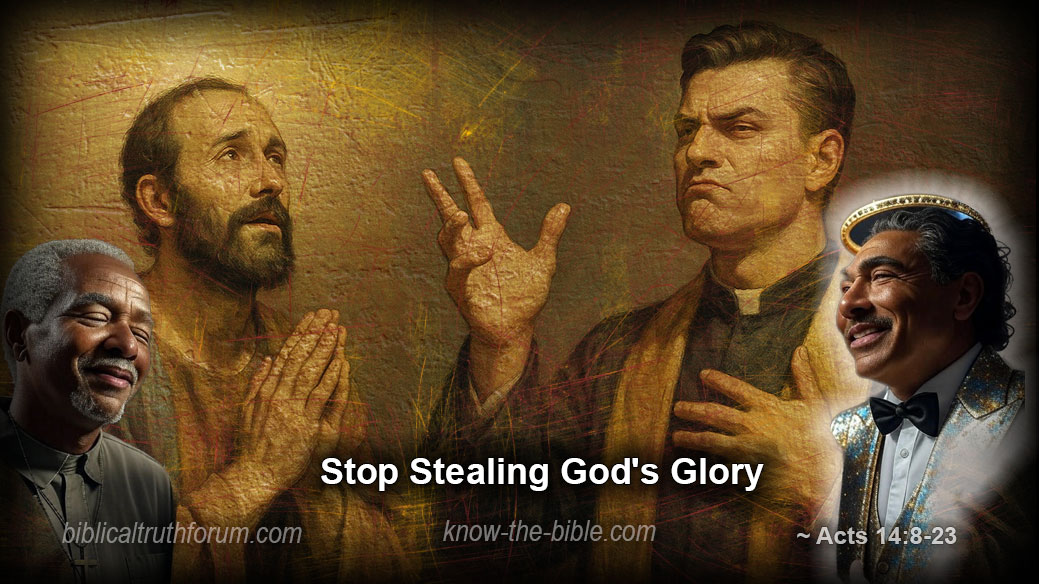What Paul Refused That Some Pastors Crave Today
In Acts 14:8–23, we see a powerful miracle unfold in the city of Lystra. A man who had been crippled from birth hears Paul preach, and Paul, seeing his faith, tells him to stand up. The man jumps up and walks. It was a clear, undeniable act of God. But what happened next was just as revealing, maybe even more.
The crowd reacts with pagan confusion. They shout in their own language that the gods have come down in human form. They call Barnabas Zeus and Paul Hermes. They even bring animals and garlands to sacrifice to them. At that moment, Paul and Barnabas were facing a temptation that many so-called “ministers” today fail: the temptation to accept the praise of men instead of pointing all glory to God.
But what did these two men of God do? They tore their clothes, rushed into the crowd, and cried out, “We also are men of like nature with you, and we bring you good news, that you should turn from these vain things to a living God” (Acts 14:15). They refused to share in God’s glory. They didn’t enjoy the fame or build a following. They pointed the crowd back to the Creator, the One who made heaven and earth.
This is what true biblical ministry looks like. It’s humble, it’s God-centered, and it always deflects praise to the Lord. Isaiah 42:8 says, “I am the LORD, that is my name; and my glory will I not give to another.” Yet today, we see a flood of preachers, musicians, and influencers who build their platforms on God’s name but bask in the spotlight themselves. They crave followers, applause, and recognition, but Paul and Barnabas showed us that real servants of God will never accept the worship that belongs to Him alone.
Meanwhile, in this same passage, Jews from Antioch and Iconium come to stir up trouble. They persuade the crowd to stone Paul and leave him for dead. What was their motive? The Bible gives us a clear answer: envy.
Back in Acts 13:45, we’re told plainly: “But when the Jews saw the multitudes, they were filled with envy.” That same spirit followed Paul from town to town. They hated that Gentiles were coming to God without converting to Judaism. They hated that Paul had boldness, clarity, and power they couldn’t match. And they hated the gospel of grace that exposed their dead religion. So instead of examining their hearts, they attacked the messenger.
It’s the same today. Many reject the gospel not because they’ve examined it and found it false, but because they’re full of pride, jealousy, and love for the praise of men. John 12:43 says of the religious leaders, “For they loved the praise of men more than the praise of God.”
Let’s be clear: people who crave praise will steal it from God. People who are jealous of others being used by God will oppose the truth out of pride. And people who have never been born again may do religious things, but they cannot truly give God the glory He deserves.
Paul and Barnabas were stoned, not praised. They were rejected, not celebrated. But they walked away with clean hands because they gave God the glory and refused to lie to the people just to be accepted.
So here’s the question for today’s church: Are we pointing people to Christ, or are we trying to become celebrities in His name?
The true servant of God echoes the words of John the Baptist in John 3:30, “He must increase, but I must decrease.”
If you’re doing ministry to be seen, you’re not serving Christ. If you’re jealous when others are used by God, you’re not walking in the Spirit. If you accept glory that belongs to the Lord, you’re not building the Kingdom, you’re building yourself.
And that path ends in judgment.
Let God be glorified, let self be crucified, and let the gospel be preached without compromise.
2 Kings 3:1-4:17
Acts 14:8-28
Psalm 140:1-13
Proverbs 17:22
New Testament: Acts 14:8-28
Summary:
Paul and Barnabas at Lystra
Paul Stoned at Lystra
Paul and Barnabas Return to Antioch in Syria
Paul was a man on the move but not a man easily moved because of difficulties. When he and Barnabas were expelled from Antioch well, they just shook off the dust of their feet and went to Iconium. When the people there tried to stone them they went to Lystra where they were treated like gods. That was a greater danger than even the persecution when you think about it.
See, crowds are very fickle. They changed their minds and stoned Paul but he just got up and went to another place, this time to Derby. That was not all. Paul and Barnabas had the courage to retrace their steps so they could help and encourage the new Christians. And when they returned home they told the church what the Lord had done, not what they had suffered.
Paul and Barnabas put Christ first, others second and themselves last. They had a job to do and they were determined by God’s grace to do it. How much does it take to move you out of the will of God? It was David Sarnoff who that wrote the will to persevere is often the difference between failure and success.
Overview: Acts 13-28 Click Here to Watch Video
Views: 7



